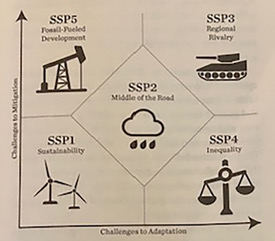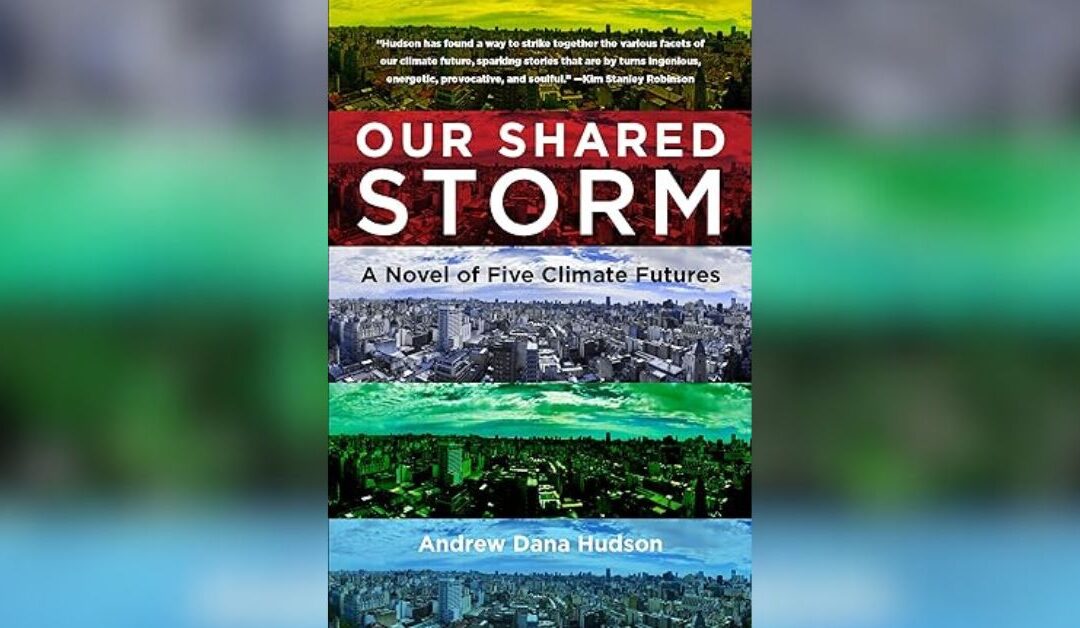Prepared by Ross Thrasher
In Our Shared Storm: A Novel of Five Climate Futures (Fordham University Press, 2022) Andrew Dana Hudson has written an intriguing quintet of stories based on the IPCC Sixth Assessment Report of 2021. Using a futurist technique called “scenario thinking”, Hudson has imagined five alternative climate change outcomes based on various projections.
The IPCC Report has calculated five possible Shared Socioeconomic Pathways (SSPs) that would give rise to different climate policies and greenhouse gas emissions scenarios. Here is a brief summary of these SSPs:
SSP1: Sustainability (Taking the Green Road) – More inclusive development that respects environmental boundaries. Reduced inequality worldwide. Consumption is oriented toward low material growth and lower resource and energy intensity.
SSP2: Middle of the Road – Continuation of previous social, economic and technological trends, with slow progress toward sustainable development goals. Overall the intensity of resource and energy use declines, but environmental systems still experience some degradation.
SSP3: Regional Rivalry (A Rocky Road) – Nationalism and regional conflicts persist at the expense of broader-based goals. Investments in education and technology decline. Economic development is slow and the environment degrades in some regions.
SSP4: Inequality (A Road Divided) – A widening gap between globally-connected society and fragmented, low-tech economies. Social cohesion breaks down and unrest becomes more common.
SSP5: Fossil-Fueled Development (Taking the Highway) – Increasing faith in competitive markets and technological progress as the path to sustainable development. Continued exploitation of fossil fuels, coupled with environmental management through geo-engineering.

Each of the five novelettes that evolve from these SSPs in Our Shared Storm is about 40 pages long. The stories all take place at the 2054 annual UN climate conference, COP60 in Buenos Aires, Argentina. The conference is interrupted, ironically, by a “neverstorm”. Four characters feature in all five stories: Noah and Luis are an American and an Argentine, and the two women, Saga and Diya, are from Sweden and India. Their roles are slightly different in each segment, but their backstories remain the same. Noah and Diya come from privileged families, while Luis and Saga have climbed out of poverty. Noah is a labour advocate, Saga is an artist, Diya is a senior COP administrator, and Luis is a local volunteer.
Four of the five mini-fictions offer glimpses into less-than-ideal alternative futures. In the SSP5 story, global emissions remain high but environmental disasters are seen as marketing opportunities. “The world looks to technology and geoengineering to solve the climate crisis.” In SSP4, a kidnapping/hostage drama at COP60 is a proxy for a future in which disadvantaged communities rebel as they continue to suffer disproportionately from climate change. The SSP3 scenario portrays a world divided — an argument among COP delegates in a bar —after wars and xenophobia have prevented progress on climate mitigation and adaptation. And the SSP2 example offers a more hopeful tale of preparedness and cooperation in the face of a superstorm, although the world’s dangerous warming has not been halted.
As noted above, SSP1 is the “sustainability pathway”, the best option for flatlining global heating. In the fictional vignette based on this scenario, Our Shared Storm is brimming with creative concepts like arcology, the fusion of architecture and ecology to render cities more resource-efficient and more resilient in the face of climate extremes. Among other ideas Hudson cites: offshore ocean farming, carbon waste reservoirs, rebuilding glaciers.
Hudson has fashioned an imaginative narration of several plausible planetary scenarios over the next few decades. The stories in Our Shared Storm are fragmentary, but illustrative. The characters are engaging and articulate. The author displays a keen grasp of the human challenges we face going forward.
See what else we have in GTEC’s Communication & Media (formally GTEC Blog)! Read articles on climate change, sustainability, education, and more!

